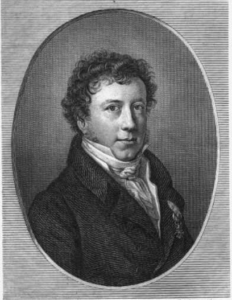Melancholy
(Poet's title: Wehmut)
Set by Schubert:
D 772
[1822 or 1823]
Wenn ich durch Wald und Fluren geh,
Es wird mir dann so wohl und weh
In unruhvoller Brust.
So wohl, so weh, wenn ich die Au,
In ihrer Schönheit Fülle schau
Und all die Frühlingslust.
Denn was im Winde tönend weht,
Was aufgetürmt gen Himmel steht,
Und auch der Mensch, so hold vertraut
Mit all der Schönheit, die er schaut,
Entschwindet und vergeht.
When I walk through the woods and fields
I then begin to feel so happy and so sad
In my restless breast.
So happy, so sad, when I look at the meadow,
When I behold it in the fullness of its beauty,
And all the delight of spring.
Because, whatever sounds are carried on the wind,
Whatever stands and towers up towards the sky,
And even human beings, so beautifully familiar,
With all the beauty that they behold,
Will disappear and pass away.
All translations into English that appear on this website, unless otherwise stated, are by Malcolm Wren. You are free to use them on condition that you acknowledge Malcolm Wren as the translator and schubertsong.uk as the source. Unless otherwise stated, the comments and essays that appear after the texts and translations are by Malcolm Wren and are © Copyright.
☙
Themes and images in this text:
Chest / breast Fields and meadows Heaven, the sky Melancholy Spring (season) Wind Woods – large woods and forests (Wald)
Things can indeed be agonisingly beautiful. All of the delights of spring can be too much for us to bear, if, like the poet, we are restless or dissatisfied. It becomes too apparent that the outer blossoming does not correspond to our inner frustrations or longings. Then there is the pain that comes from accepting the inability of the world to stay as it is. It is this awareness of transcience that is central to cherry blossom viewing (hanami) in Japan, for example. The beauty can never be permanent.
The form of Collin’s poem, with its asymmetric 11 lines, reflects the experience of coming to terms with the pain in the beauty of the world. The first stanza is so balanced that it sets up expectations that it will be followed by a second 6 line stanza. However, the reader encounters a number of disturbances in the course of the second stanza. Line 9 has an extra two syllables, which throws the rhythm and slows down the processing of the ideas (inviting us to register the shock of the realisation of what is in store for human beings). At the end of line 10 we notice that the second stanza has a different rhyme scheme to the first (aabccb ddeed). The rhyming vowels of stanza 1 are repeated in stanza 2 but a final consonant (/t/) closes off each line (e.g. weh / weht; Au / vertraut), reflecting the idea of more general closure. Line 1 ends with ‘geh’, moving forwards, but the final line ends with ‘vergeht’, passing away.
☙
Confirmed by Peter Rastl with Schubert's probable source, Selam. Ein Almanach für Freunde des Mannigfaltigen auf das Jahr 1813. Herausgegeben von I.F.Castelli. Wien, gedruckt und im Verlage bey Anton Strauß, page 203.
To see an early edition of the text, go to page 203 [253 von 342] here: http://digital.onb.ac.at/OnbViewer/viewer.faces?doc=ABO_%2BZ255496507


